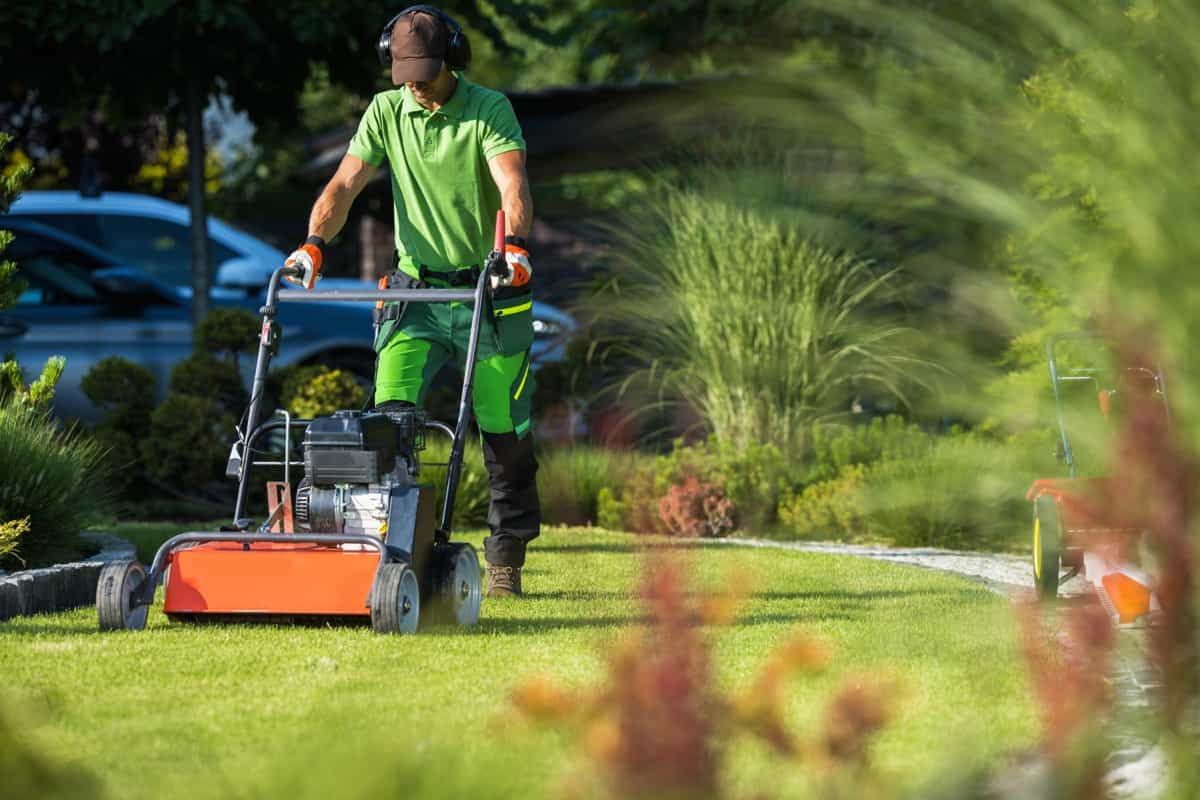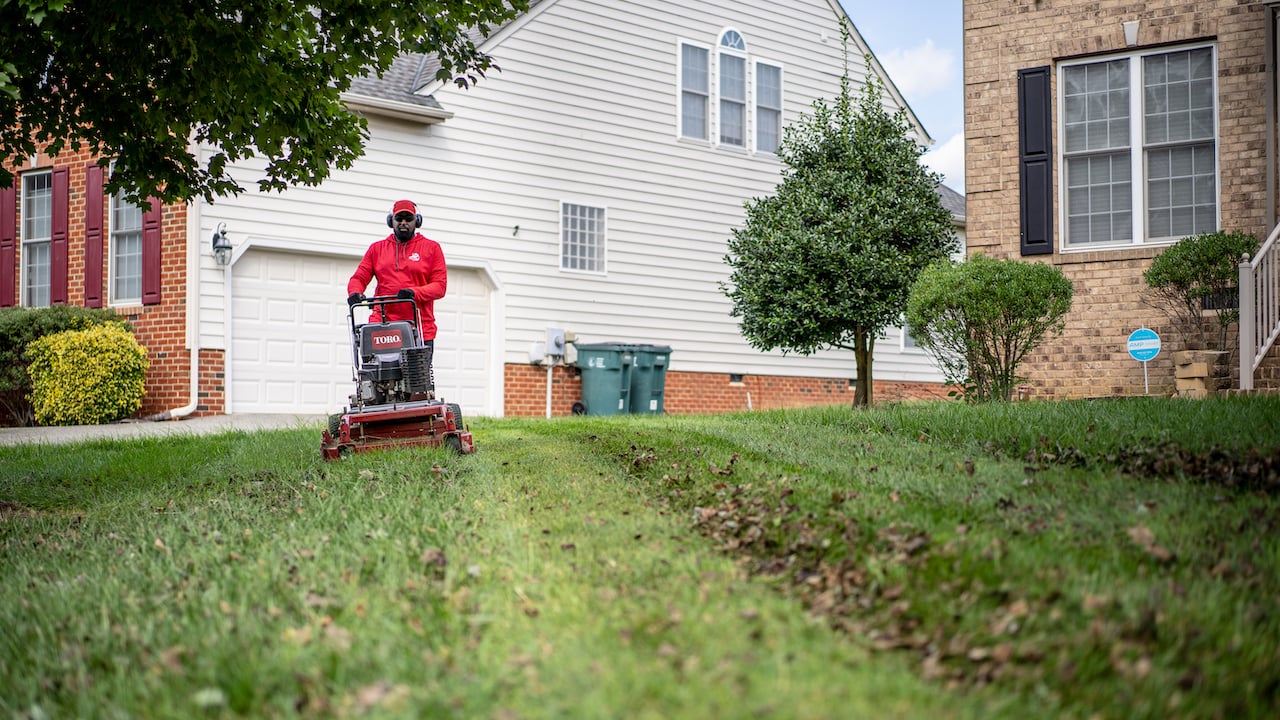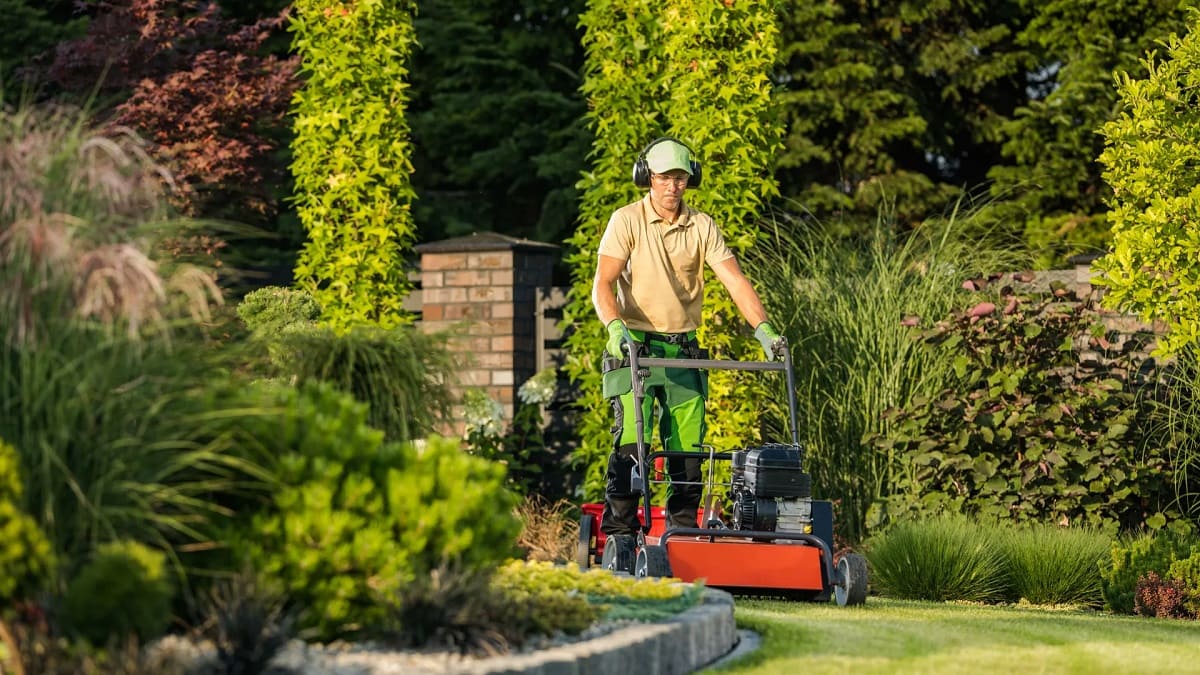Home>Garden Essentials>What Licenses Do I Need To Open A Lawn Care Business


Garden Essentials
What Licenses Do I Need To Open A Lawn Care Business
Modified: March 7, 2024
Learn the essential licenses required to start a garden-focused lawn care business and succeed in the industry. Find out what permits you need for a thriving garden care service.
(Many of the links in this article redirect to a specific reviewed product. Your purchase of these products through affiliate links helps to generate commission for Storables.com, at no extra cost. Learn more)
Introduction
Starting a lawn care business can be a great opportunity for those with a passion for gardening and outdoor maintenance. Whether you’re a seasoned gardener looking to turn your hobby into a business or a budding entrepreneur exploring new career paths, opening a lawn care business can be a rewarding venture.
However, before you can start mowing lawns and tending to gardens, there are several licenses and permits you need to obtain to ensure that your business is legal and compliant with local regulations. These licenses not only demonstrate your professionalism and commitment to quality, but they also protect both you and your clients.
In this article, we will explore the licenses and permits necessary to open a lawn care business. From business license to contractor license, pesticide license to zoning regulations, we will cover all the essential aspects to help you navigate the often complex world of garden business licensing.
Key Takeaways:
- To open a lawn care business, you need licenses like a business license, contractor license, and pesticide license. These show your professionalism and ensure legal compliance.
- Don’t forget insurance, environmental permits, zoning regulations, and tax registrations. They protect your business, clients, and the environment. Stay compliant and thrive in the garden industry!
Registering Your Lawn Care Business
Before you can obtain the necessary licenses and permits for your lawn care business, you must first register your business with the appropriate authorities. This step is crucial as it establishes your business as a legal entity and allows you to operate within the confines of the law.
The registration process may vary depending on your location, but typically involves registering your business name, obtaining a tax identification number, and applying for any required local business permits. It is important to check with your local government agencies or consult with a business lawyer to ensure that you complete all the necessary steps for registration.
By officially registering your lawn care business, you not only gain legal recognition, but you also open doors to various benefits and opportunities. For instance, you may become eligible for business loans, grants, or contracts that require proof of business registration. Additionally, registering your business helps build credibility and trust with potential clients, as it demonstrates your commitment and professionalism.
Once you have successfully registered your lawn care business, you can proceed with obtaining the specific licenses and permits required for operating in the garden maintenance industry.
Business License
A business license is a basic requirement for any legal and legitimate business operation, including a lawn care business. It is often obtained from the local government agency responsible for business licensing in your area.
The purpose of a business license is to ensure that your business complies with local laws and regulations, including zoning restrictions and safety requirements. It also allows the government to keep track of businesses operating in the area for tax purposes and public safety.
To obtain a business license, you will generally need to provide information such as your business name, address, contact information, and possibly proof of insurance. Depending on your location, there may also be fees associated with obtaining and renewing the license.
Having a valid business license not only keeps you in compliance with the law, but it also instills confidence in your clients that you are a legitimate and trustworthy business. Many clients will ask for proof of your business license before hiring your services, so it is important to have it readily available.
Remember that business license requirements may vary depending on where you are located, so it is crucial to check with your local government agency or online resources specific to your area to ensure that you are meeting all the necessary requirements.
Obtaining a business license is an important step in establishing your lawn care business as a legal and credible entity. It not only demonstrates your commitment to operating ethically, but also helps you gain trust and confidence from potential clients.
Contractor License
In addition to a business license, many jurisdictions require lawn care businesses to obtain a contractor license. A contractor license is specifically geared towards businesses that provide services involving construction, repair, or alteration of structures, which can include landscaping and outdoor maintenance.
The requirements for obtaining a contractor license may vary depending on your location, but typically involve passing a licensing exam, providing proof of experience and/or training, and submitting an application along with the required fees.
Having a contractor license not only allows you to legally operate as a lawn care business, but it also demonstrates to potential clients that you have the necessary skills and expertise to perform the required tasks. It is often viewed as a mark of professionalism and can differentiate you from unlicensed competitors.
Before applying for a contractor license, familiarize yourself with the specific requirements set forth by your local licensing board. This may include meeting certain education or experience criteria, obtaining liability insurance, and maintaining a good disciplinary record.
Remember that obtaining a contractor license is not only a legal requirement, but also a way to ensure that you are providing high-quality services to your clients. It demonstrates your commitment to professional standards and allows you to confidently market your business as a skilled and credible contractor.
Keep in mind that the process of obtaining a contractor license can be time-consuming and may require upfront costs. However, the benefits of having a valid license far outweigh the initial investment. It not only enhances your reputation and credibility, but also opens up opportunities for larger contracts and partnerships.
Overall, obtaining a contractor license is an essential step in establishing your lawn care business as a reputable and proficient service provider. It serves as evidence of your qualifications and ensures that you are operating within the boundaries of the law.
Pesticide License
If your lawn care business involves the use of pesticides or other chemical treatments, it is likely that you will need to obtain a pesticide license or certification. This license is typically required to ensure that pesticide applications are done safely and effectively, minimizing any potential risks to people, pets, and the environment.
The specific requirements for obtaining a pesticide license may vary depending on your location and the types of pesticides you will be using. In general, you will need to complete a pesticide applicator training program, pass an exam, and submit an application to the appropriate licensing agency.
The pesticide license may be categorized into different levels or types depending on the type of pesticide application you plan to perform. For example, there may be separate licenses for general pesticide use, herbicide application, or insecticide treatment.
Obtaining a pesticide license showcases your knowledge and expertise in the proper use and handling of pesticides. It also ensures that you are following the laws and regulations established to protect public health and the environment.
As a licensed pesticide applicator, you will have access to a wider range of pest control solutions, giving you a competitive edge in the lawn care industry. Clients will feel confident knowing that you are qualified to handle their specific pest-related issues.
It is important to note that pesticide laws and regulations are constantly evolving, with new products and application techniques being introduced. Therefore, it is essential to stay up-to-date with any changes in regulations and renewal requirements for your pesticide license.
Remember, safety should always be a priority when using pesticides. Be sure to follow all label instructions, use appropriate protective gear, and take necessary precautions to minimize any potential risks to yourself, your clients, and the environment.
By obtaining a pesticide license, you demonstrate your commitment to environmentally responsible practices and ensure that your lawn care business is operating legally and ethically.
Before opening a lawn care business, make sure to research and obtain the necessary licenses and permits required by your local government. This may include a business license, landscaping contractor license, and pesticide application certification.
Read more: What Do I Need To Get A Construction License
Insurance Requirements
As a lawn care business owner, it is essential to have proper insurance coverage to protect yourself, your employees, and your clients from any unforeseen accidents or damages. While insurance requirements may vary depending on your location and the size of your business, there are several common types of insurance policies that you should consider.
1. General Liability Insurance: This type of insurance provides coverage for property damage, bodily injury, and personal injury claims that may arise from your business operations. It offers financial protection in the event of accidents, such as a customer tripping over a lawnmower or damage to a client’s property during a job.
2. Workers’ Compensation Insurance: If you have employees working for your lawn care business, you may be required by law to have workers’ compensation insurance. This coverage provides benefits to employees who are injured or become ill due to work-related activities, including medical expenses, lost wages, and rehabilitation.
3. Commercial Vehicle Insurance: If you use vehicles for your lawn care business, such as trucks or trailers, it is crucial to have commercial vehicle insurance. This policy provides coverage for accidents, property damage, and injuries that may occur while operating business vehicles.
4. Equipment Insurance: Your lawn care equipment is a significant investment, and it is important to protect it against theft, damage, or loss. Equipment insurance provides coverage for your tools, machinery, and other essential equipment used in your business.
5. Bonding Insurance: Some clients may require you to have bonding insurance, which provides financial protection in case you fail to complete a job, meet contractual obligations, or cover any damages or losses resulting from your work.
It is crucial to consult with an insurance professional to assess your specific insurance needs and identify any additional types of coverage that may be relevant to your lawn care business.
Having appropriate insurance coverage not only safeguards your business and assets, but it also gives your clients peace of mind knowing that you are a responsible and reliable service provider.
Remember, insurance requirements may vary depending on local regulations and client demands, so it is important to stay informed and up-to-date to ensure that you are adequately protected.
Environmental Permits
Operating a lawn care business involves working with nature and the environment. To ensure that your business is environmentally responsible and compliant with regulations, you may need to obtain certain environmental permits.
The specific permits required may vary depending on your location and the services you offer, but some common environmental permits for a lawn care business may include:
- Stormwater Permit: If your lawn care activities involve the use of fertilizers, pesticides, or other chemicals, you may be required to obtain a stormwater permit. This permit helps regulate the discharge of pollutants and contaminants into storm drains and waterways, protecting the local ecosystem.
- Waste Disposal Permit: If you generate waste materials, such as green waste or debris from landscaping activities, you may need a waste disposal permit. This permit ensures that waste is properly managed, recycled, or disposed of in an environmentally friendly manner.
- Erosion Control Permit: If your business involves disturbing soil, such as during excavation or grading, you may need an erosion control permit. This permit ensures that you take appropriate measures to prevent soil erosion and sedimentation, which can impact water quality and habitats.
It is important to research the environmental regulations in your area and determine which permits are necessary for your specific lawn care business activities. Contact your local environmental agency or consult with an environmental specialist to gain a clear understanding of the requirements.
Complying with environmental permits not only demonstrates your commitment to preserving the environment, but it also helps to protect your business from potential fines and penalties. It also reassures your clients that you operate in an environmentally responsible manner.
Once you have obtained the necessary environmental permits, be sure to follow the conditions and guidelines outlined in the permits. Implement best practices to minimize the environmental impact of your operations, such as using eco-friendly products, practicing water conservation, and promoting sustainable gardening practices.
By obtaining and complying with environmental permits, you can ensure that your lawn care business operates in an environmentally sustainable and responsible manner. This not only benefits the environment but also enhances your reputation as a conscientious and trustworthy business.
Zoning Regulations
Zoning regulations are an important aspect to consider when starting a lawn care business. These regulations are put in place by local government authorities and dictate how land and properties within a specific area can be used.
Before establishing your business operations, it is crucial to determine whether zoning regulations permit the type of activities you plan to conduct. Some zoning regulations restrict commercial activities in residential areas or have specific requirements for home-based businesses.
Here are some key points to consider regarding zoning regulations for your lawn care business:
- Commercial Zoning: Commercial zoning designates specific areas for commercial activities, such as businesses and retail establishments. It is important to ensure that your business location falls within a designated commercial zone.
- Home-based Business: If you plan to operate your lawn care business from your home, you may need to adhere to specific regulations for home-based businesses. These regulations may include restrictions on signage, parking, noise levels, and storage of equipment.
- Special Permits or Variances: In some cases, you may need to apply for special permits or variances if your business activities do not align with the existing zoning regulations. These permits allow you to operate your business under certain conditions or in areas where commercial activities are not typically allowed.
It is important to conduct thorough research and consult with local zoning authorities or a zoning attorney to ensure full compliance with zoning regulations. Failure to comply with zoning regulations can result in fines, penalties, and potential closure of your business.
Additionally, consider the impact your business activities may have on the surrounding neighborhood. Be mindful of noise levels, equipment storage, and other factors that may affect the quality of life for nearby residents. Maintaining a good relationship with your neighbors can help ensure the longevity and success of your business.
By understanding and adhering to zoning regulations, you can ensure that your lawn care business operates legally and harmoniously within its designated area. It also helps to maintain the overall aesthetic and function of the community.
Tax Registrations
When starting a lawn care business, one of the important aspects to consider is the tax obligations and registrations required by the government. Proper tax registration ensures that you comply with tax laws and regulations and avoids any legal or financial issues in the future.
Here are some key tax registrations to consider for your lawn care business:
- Employer Identification Number (EIN): An EIN is a unique identification number issued by the IRS for businesses with employees. Even if you do not have employees currently, obtaining an EIN can still be beneficial as it establishes a separate identity for your business for tax purposes.
- Sales Tax Registration: If your lawn care business sells products or provides taxable services, it is likely that you will need to register for a sales tax permit. This allows you to collect and remit sales tax to the appropriate state or local tax authorities.
- State and Local Business Taxes: Depending on your location, you may be required to register for state and local business taxes. These can include income tax, property tax, and any other applicable taxes required by your state or local government.
- Payroll Taxes: If you have employees, you will need to register for payroll taxes. This includes withholding and remitting federal income tax, Social Security, and Medicare taxes from your employees’ wages.
It is crucial to consult with a tax professional or the relevant tax authorities in your area to determine the specific tax registrations required for your lawn care business. Tax laws can vary from state to state, so it is important to stay informed and up-to-date with your tax obligations.
Proper tax registration ensures that you are fulfilling your responsibilities as a business owner and helps avoid any penalties or fines for non-compliance. It also allows you to take advantage of tax deductions and credits that may be available to your business.
Keeping accurate records of your income and expenses is essential for tax reporting purposes. Consider using accounting software or consulting with an accountant to ensure that your financial records are accurate and organized.
By understanding and fulfilling your tax registration obligations, you can operate your lawn care business with confidence, knowing that you are compliant with tax laws and regulations.
Conclusion
Opening a lawn care business requires more than just gardening skills and a passion for the outdoors. It also involves obtaining the necessary licenses, permits, and registrations to ensure that your business operates legally and ethically.
In this article, we have explored the various licenses and permits you may need for your lawn care business. We discussed the importance of obtaining a business license to establish your business as a legal entity and gain credibility with clients. The contractor license ensures that you have the necessary skills and qualifications to offer professional services. The pesticide license demonstrates your commitment to safe and responsible chemical use. Additionally, we highlighted the significance of insurance coverage, environmental permits, zoning regulations, and tax registrations.
Complying with these requirements not only safeguards you and your clients but also helps build a reputable and thriving business. It showcases your professionalism, expertise, and commitment to delivering high-quality services.
As regulations and requirements may vary by location, it is essential to thoroughly research and consult with the relevant authorities or professionals to ensure that you meet all the necessary obligations.
Remember, running a successful lawn care business goes beyond obtaining licenses and permits. It requires diligent care for your clients’ landscapes, delivering exceptional service, and maintaining positive relationships within your community.
By navigating the world of licensing, permits, and registrations successfully, you can establish yourself as a trusted and reliable lawn care professional and enjoy the rewards of a thriving business.
Frequently Asked Questions about What Licenses Do I Need To Open A Lawn Care Business
Was this page helpful?
At Storables.com, we guarantee accurate and reliable information. Our content, validated by Expert Board Contributors, is crafted following stringent Editorial Policies. We're committed to providing you with well-researched, expert-backed insights for all your informational needs.














0 thoughts on “What Licenses Do I Need To Open A Lawn Care Business”